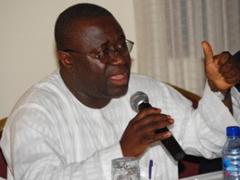
The recent arrest of a Ghanaian drug trafficker at the Heathrow Airport puts Ghana’s reputation at risk, the Head of the Department of Research at the Kofi Annan International Peacekeeping Training Centre (KAIPTC) in Accra, Dr Kwesi Aning has told STARR NEWS.
“It’s not good for our image, nevertheless, this demonstrates the strengthening and the deepening of the collaboration, and the trust between NACOB and the agencies in the UK, Spain, France, Germany and Holland,” Aning said Monday.
In a statement issued Monday by the Ghana Narcotics Control Board (NACOB), the anti-drug enforcement body clarified that the lady suspect – Nayele Ametefe - travelled on an Austrian passport and not with a Ghanaian diplomatic passport, as earlier reports had claimed.
Ametefe’s arrest ON November 10, according to NACOB, was made through a collaborative effort between the Board and its British partners.
“On the 9th November, 2014, one Ms. Nayele Ametefe boarded British Airways flight number BA 078 from Accra to London. She was arrested at Heathrow International Airport. She had flown on a first-class ticket using travel miles on British Airways point. The ticket had been purchased on 8th October, 2014 and had been altered three times.”
It added: “In her possession she had two (2) suitcases. Only one (1) of the suitcases was checked in (Baggage tag number BA 059801), and nothing of interest was found. In the other suitcase which was believed to be hand carried onto the plane, 10kgs of cocaine was found among her clothing. The cocaine were wrapped in one kilo blocks. In her handbag, she had further two (2) kilos (blocks).
“It is worthy to note that Ms. Nayele Ametefe travelled on Austrian passport number P4187659 and not on Ghanaian Diplomatic passport as being speculated. She also had in her possession an ordinary Ghanaian passport number G0364497 issued on 3rd August, 2012. Investigations are still ongoing,” NACOB explained.
Dr Aning told STARR NEWS there must be better collaboration between NACOB and the security agencies in the countries where the drugs come from, so as to tackle the trafficking at the source.
“…How do we better collaborate with the source of this drugs so that in getting information from the source country, we can nip it in the bud, so that they don’t either transit through Ghana, or we don’t become a destination country, because immediately this is drugs related to Ghana and Ghanaians are arrested, it is our reputation that is put on the line and I think we’ve got to continue the collaboration to ensure our hard-won reputation is not put at risk.”
He also said there is the need to investigate why Ghana is attractive to traffickers.
“I think the question that we should be raising is that if these drugs entered Ghana from outside, what is it that still makes Ghana an attractive destination and transit point? Where do we need to deepen our collaboration, how do we close the gap, what kinds of strategies do we need to put in place to ensure that the network that this lady who has been arrested passed, that those networks are put under surveillance – most people will be innocent – but I’m sure she’s not operating alone,” Aning said.